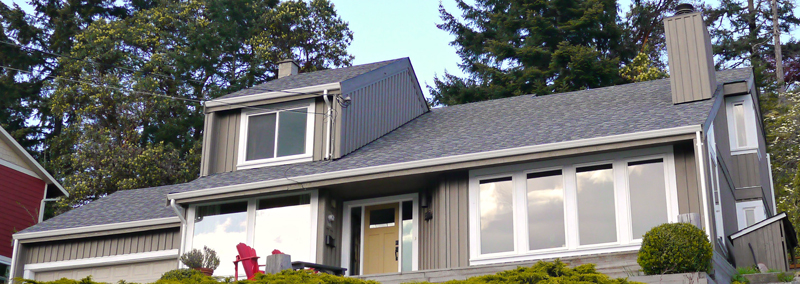When it comes to choosing which siding to use for your home or office building, there are a number of options to choose from, including cedar shake, vinyl, hardie-board and metal cladding. A siding solution that is rapidly growing in popularity, metal cladding (also known as metal siding) is both long-lasting and durable, as well as resistant to fire, pests and mold.
As metal cladding is a relatively new choice compared to other siding materials, many people remain unfamiliar with this material and its qualities. At Phoenix Siding we strongly believe that homeowners should know of all the options at their disposal when it comes to renovating or build their home. With that in mind, it’s worth the time to find out about the pros and cons of each choice before settling on one particular type of siding material.
PROS OF METAL CLADDING
- Metal cladding requires minimal maintenance compared to other siding materials such as cedar shake or vinyl. Metal cladding is resistant to inclement weather such as snow, frost, and heat from the sun.
- Brick and wood siding can absorb moisture, causing the material to weaken over time in wetter climates. Metal, however, does not. Moisture causes mold, mildew, and fungus problems, but that won’t be the case with metal.
- Old vinyl siding doesn’t always get recycled when it’s removed and instead is dumped in the landfill. Metal material is almost always recyclable and may be re-purposed.
- Insect damage is not an issue with metal siding, saving you time and money from repairs and preventative measures.
- Innovative modern design options. Metal was once the siding of choice for institutional-looking commercial buildings, but that’s no longer the case. Metal cladding comes in an array of textures and colours. Combined with timber, this siding offers flexible and contemporary styles for your home. Metal also blends well with bold, saturated colours for stunning curbside appeal.
- Metal cladding offers fire protection. Fire will not spread easily with metal exteriors. Furthermore, buildings are completed protected against lightning.
- Metal cladding made of aluminum is surprisingly lightweight. This is even more noticeable in wetter climates where other materials can absorb excess moisture causing the material to become even heavier. This isn’t an issue as metal cladding does not absorb moisture.
- Metal cladding is usually easier to install for professional contractors, saving homeowners some time and money compared to other siding materials.
CONS OF METAL CLADDING
- Rust can cause damage to metal. Homeowners can expect rust problems with steel siding in wetter climates if not appropriately treated. Metal surfaces can be scratched, paint can peel, rust can result. There are spray-on treatments available to help protect steel siding, thereby increasing its lifespan. Selecting high-quality metal siding will also decrease the threat of rust.
- The materials used in metal cladding are usually more expensive than other siding options. The high up-front costs of metal cladding are mitigated by the long-term savings from reduced maintenance and longer lifespan compared to cheaper materials.
- Noise can be an issue with metal. You will definitely hear it when it rains. Although, this may not be a problem for individuals who adore the sound of rainfall.
- Prone to dents. Softer aluminum siding may be dented and punctured during a substantial hailstorm or windstorm that blows branches. Homeowners should consider their local climate and location when choosing a siding material.
The experts at Phoenix Siding can assist you in giving your property an instant facelift with exterior metal cladding. We offer reasonable rates and years of expertise to make your home dreams a reality. Call us at 250-758-3818 or email us blake@phoenixsiding.ca today to find out more about what we can do for you!



